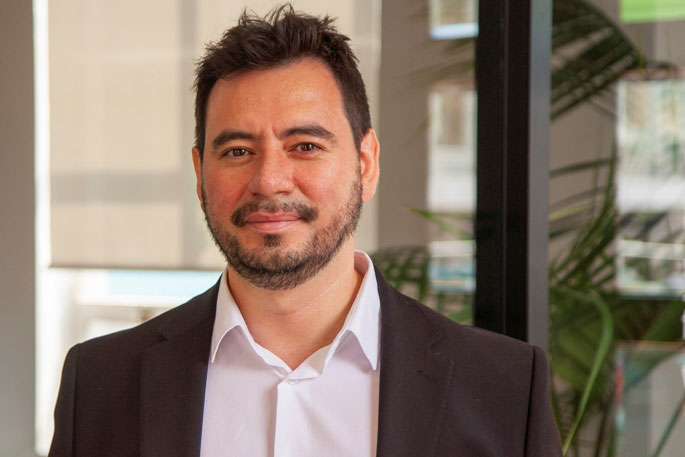It was a double-funding win for PlantTech in the Ministry for Business, Innovation & Employment's (MBIE) latest Endeavour Fund round.
In addition to research on plantation forests, the institute is also leading a two-year international project that uses airborne remote sensors to discover what is causing plant stress in kiwifruit orchards.
The project received $1 million in MBIE funding.
Research started in November on an airborne remote sensor project. Researchers want to determine how a sensor can measure sun-induced fluorescence (SIF) – an indicator of photosynthetic activity and plant stress, such as a lack of water, high temperatures and nutrient deficiency.
Principal Research Scientist Dr Alvaro Orsi is leading the project and says data from multiple aerial and ground sensors will be used to generate maps showing the photosynthetic activity of kiwifruit.
'These maps will help kiwifruit growers understand what regions in their orchards are photosynthesising less efficiently and pinpoint the cause of this plant stress.
'Such capability will allow growers to improve kiwifruit orchard productivity and environmental sustainability.”
Dr Orsi says although SIF has been recognised as a robust probe of photosynthesis activity, traditional techniques fail to account for the complex structure of the vegetative canopy, which impacts on the calculations.
'This project aims to leverage modern artificial intelligence (AI) techniques to deliver robust predictions by constructing a 3D virtual orchard based on data collected on real orchards.
'The virtual orchard will simulate how sunlight interacts with the kiwifruit canopy, including the photosynthesis process and the chlorophyll fluorescence emission. This simulation will deliver an accurate prediction of canopy reflectance and fluorescence spectrum that can be compared against real measurements.”
He says they also plan to use information from kiwifruit orchard yield maps.
'By comparing these maps with the 3D virtual orchard simulation, our technology will reveal the impact of plant stress and photosynthetic efficiency on orchard productivity. This will enable a pathway to improve productivity by optimising management practices.”
The project team includes experts from PlantTech, Plant & Food Research, Eurofins Ltd., Massey University, Melbourne University in Australia, and Durham University in the United Kingdom with international expertise in remote sensing, numerical physical simulations, machine learning, and computer vision.
The result will allow for localised orchard management practices to address specific sources of stress.
'Such a strategy will result in further optimisation of irrigation and fertilisation management, and crop yield and quality overall by promoting a pathway to enable photosynthetically-efficient crops.
'These impacts will help mitigate the global challenges of increasing world demand for sustainable food production, as climate change makes traditional orchard management practices progressively more obsolete.
'Improved horticultural practices will make horticultural businesses more financially sustainable. In the first instance these benefits will flow to the kiwifruit industry, as Aotearoa New Zealand's largest horticultural exporter, and kiwifruit growers in particular,” he says.
'In time, the benefits will transfer into other horticultural exports, such as the avocado, apples, and pears export sectors.”



0 comments
Leave a Comment
You must be logged in to make a comment.